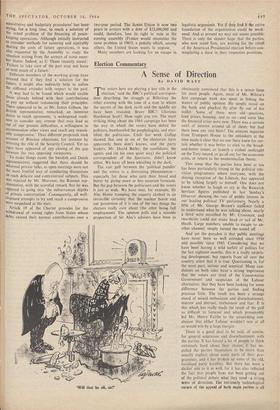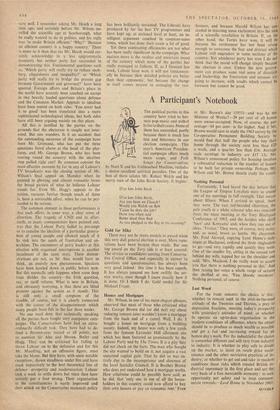Election Commentary
A Sense of Direction
By DAVID WATT 'Mlle voters here are playing a key role in the
I election,' said the BBC's political correspon- dent describing the struggle at Billericay the other evening with the tone of a man to whom the secrets of the dark earth and the middle air have been revealed. Brave BBC! Glorious Hardiman Scott! How right you are. The rnost striking thing about the 1964 campaign has been the way in which the voters have defied the pollsters, bamboozled the psephologists, and mys- tified the politicians. Until last week Gallup showed that one in six of the electorate have apparently been don't knows, and the party leaders, Mr. David Butler, the candidates, the agents and (in his own quiet way) the political correspondent of the Spectator, didn't know either. We have all been whistling in the dark.
The vast gulf between the 'political pundits' and the voters is a distressing phenomenon— especially for those who earn their bread and butter by giving more or less accurate forecasts. But the gap between the politicians and the voters is just as wide. We have seen, for example, Sir Alec Home tramping the country clothed in an invincible certainty that the nuclear bomb and our possession of it is one of the two things the electors really care about (the other being full employment). The opinion polls and a sizeable proportion of Sir Alec's advisers have been as 'Will that be all, sir?' obstinately convinced that this is a minor issue for most people. Again, most of Mr. Wilson's first campaign week was spent in fishing the waters of public opinion. He simply stood on the bank and plucked fly after fly out of his wallet. Some of these were old—pensions, land prices, housing, and so on—and some like the financial crisis were new. There was a certain swirl of interest around all of them; but had there been any real bites? The anxious inquiries from Transport House to the onlookers at the time made it clear that no one there knew for cer- tain whether it was better to stick to the bread- and-butter issues, or launch a violent onslaught on the Tory record, or go all out for the economic crisis, or return to the modernisation theme.
This sense that the parties have been at sea has been particularly strong in the political tele- vision programmes where everyone, with the shining exception of the Liberals, has appeared to be talking largely to himself. One does not know whether to laugh or cry at the Research Services figures published in last Sunday's Observer showing the rate of public interest in our leading political TV performers. Nearly a fifth of Mr. George Brown's audience failed to understand what he was talking about, nearly a third were mystified by Mr. Crossman, and two-thirds could not make head or tail of Mr. Heath. Large numbers, unable to escape to an- other channel, simply turned the sound off.
And yet the paradox is that public meetings have never been so well attended since 1950 and possibly 'since 1945. Considering that we have been having a wild surfeit of politics for the last eighteen months, this is a really surpris- ing development, but reports from all over the country attest that it is true. Questioning is, for the most part, serious and sceptical. Many can- didates on both sides have a strong impression that the voters are tired of the Conservative Government and suspicious of the Labour alternative; that they have been looking for some difference between the parties and finding precious little. The result has been a strange mood of mixed enthusiasm and disenchantment, interest and distrust, restlessness and fear. It is this which, has really made the result of the poll so difficult to forecast and which presumably led Mr. Henry Fairlie to the astonishing con- clusion that either Labour wouldn't win at all or would win by a large margin.
There is a good deal to be said, of course, for general scepticism and disenchantment with the parties. It has forced a lot of people to think extremely hard about their choice; it has im- pelled the parties themselves to be more than
usually explicit about some parts of their pro-
grammes; and it has broken up some of the old, fossilised party loyalties. But there has been a darker side to it as well, for it has also reflected the fact that people have not been getting out of the political debate what they need—a strong sense of direction. The extremely technological nature of the appeal of both main parties is all very well. I remember asking Mr. Heath a long time ago, and certainly before Mr. Wilson un- veiled the scientific age at Scarborough, what he really wanted to do in politics, and his reply was 'to make Britain efficient.' Why?"Because an efficient country is a happy country.' There is more to it than that (as Mr. Heath would cer- tainly acknowledge in a less epigrammatic moment), but neither party has succeeded in demonstrating this. Fundamental questions such as, 'Which party will really try to reduce snob- bery, cliquishness and inequality?' or 'Which party will really try to bridge the present gap between Government and governed?' have been ignored. Foreign affairs and Britain's place in the world have scarcely been touched on except in two heavily loaded questions about defence and the Common Market. Appeals to idealism have been muted on both sides. 'You never had it so good' has been translated into a more sophisticated technological idiom, but both sides have still been arguing mainly on this plane.
All this is justified by the parties on the grounds that the electorate is simply not inter- ested. But one wonders. Is it an accident that the outstanding successes of the campaign have been Mr. Grimond, who has put the three questions listed above at the head of the plat- form, and Mr. George Brown, who has been roaring round the country with the idealism stop pulled right out? By common consent the most effective moment by far in any of Labour's TV broadcasts was the closing section of Mr. Wilson's final appeal on Monday when he painted in glowing and almost romantic terms the broad picture of what he believes Labour stands for. Even Mr. Hogg's appeals to the nation, vacuous fustian though much of them is, have a noticeable effect, when he can be per- suaded to be serious.
The common element in these performances is that each offers, in some way, a clear sense of direction. The tragedy of CND and its after- math, as many commentators have pointed out, was that the Labour Party failed to pre-empt or to canalise the idealism of a particular genera- tion of young people and allowed much of it to sink into the sands of frustration and an- archism. The encounters of party leaders at this election with organised interruptions is another instalment of the same story. These demon- strations are not, as Sir Alec would have us think, an entirely new phenomenon. Speakers have been howled down in public before now. But this normally only happens when some deep issue divides the country—the Irish question, say, or tariff reform. What is new in Britain, and obviously worrying, is that these are blind protests against the system as it stands. This is still only a small symptom of the trouble, of course, but it is clearly connected with the causes of the disappointment which many people have felt in the last three weeks.
No one need deny that technically speaking all the parties have fought very competent cam- paigns. The Conservatives have had an extra- ordinarily difficult task. They have had to de- fend a thirteen-year record at all points, not to, mention Sir Alec and Messrs. Butler and Hogg. They can be criticised for failing to throw Labour on to the defensive and for this Mr. Maudling, not an offensive figure, must take the blame. But they have, with some notable exceptions, shown steadiness under fire and have stuck impassively to the best theoretical line of defence—prosperity and modernisation. Labour took a week to settle down but since then have scarcely put a foot wrong. Their organisation in the constituencies is vastly improved and their attack on the Conservative economic policy has been brilliantly sustained. The Liberals have produced by far the best TV programmes and have kept up, at national level at least, an in- telligent argument couched in common-sense tones, which has done their cause a lot of good.
Yet these contrasting efficiencies are not what has been really significant in the campaign. What matters more is the restless and uncertain mood of the country which none of the parties has really managed to fathom. If, as I forecast last week, Labour have won, it will not fundament- ally be because their detailed policies are better than their opponents', but because the change in itself comes nearest to assuaging the rest-
lessness, and because Harold Wilson has suc- ceeded in injecting some excitement into the idea of a scientific revolution in Britain. If, on the other hand, the Tories have won, it will he because the restlessness has 'not been strong enough to overcome the fear and distrust which Labour still engenders in some sections of the country. Yet whichever party has won I do not think that the mood will change simply because the election is over. Unless the new govern- ment can produce some real sense of direction and leadership, the frustration and tensions arc going to increase, with results which cannot be foreseen but cannot be good.



































 Previous page
Previous page